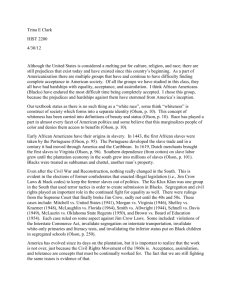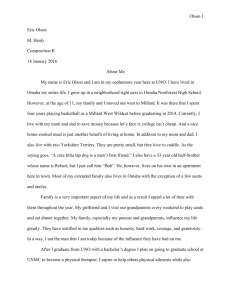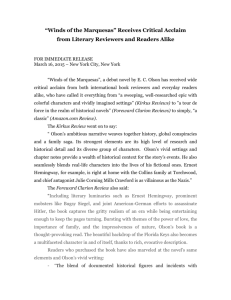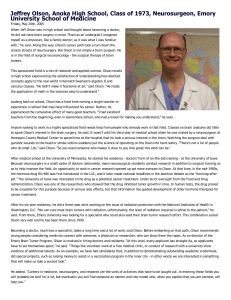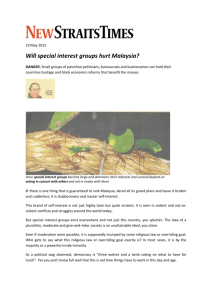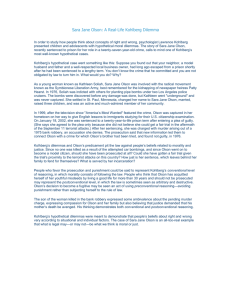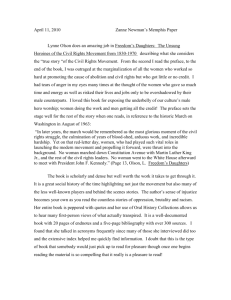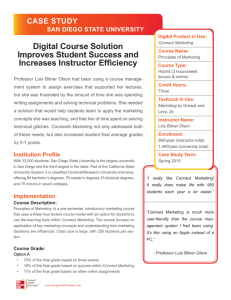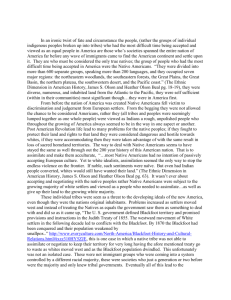Worldviews Powerpoint, Class 1 - Presbyterian Church of The Master
advertisement
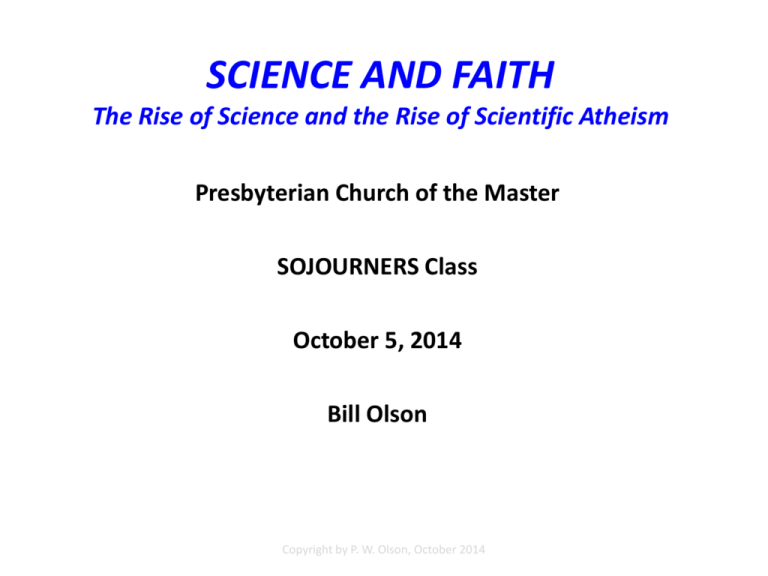
SCIENCE AND FAITH The Rise of Science and the Rise of Scientific Atheism Presbyterian Church of the Master SOJOURNERS Class October 5, 2014 Bill Olson Copyright by P. W. Olson, October 2014 Science and Faith Understanding of the current Western world-view • • What our neighbors believe What our children and grandchildren are exposed to outside of the “Christian Bubble” October 5 • The rise of science and scientific atheism – – – Brief history Current worldview in America and Western Europe Book: Mary Poplin – Is Reality Secular? Testing the Assumptions of Four Global Worldviews October 12 • You are a Miracle – – Statistics as branch of mathematics – a science The chances for the universe, the planet Earth, the first cell, intelligent life, of us talking to one another today October 19 • Consciousness – naturalism and dualism – – 10/5/14 You and I are souls Book: J. P. Moreland – The Soul How we Know it is Real and Why it Matters Copyright by P. W. Olson, October 2014 2 1. Brief History of the rise of Science and Scientific Atheism(Material Naturalism) This took place in Western Europe The industrial revolution took place in parallel The Reformation took place in parallel “Modern Western empirical science originated and flourished in the bosom of Christian Theism and originated nowhere else. … the fact is it was Christian Europe that fostered, promoted, and nourished modern science. All of the great names in early Western science, furthermore, Nicholas Copernicus, Galileo Galilei, Isaac Newton, Robert Boyle, John Wilkins, Roger Cotes and many others–all were serious believers of God. Indeed the 20th century physicist C. F. Weisacker goes so far as to say,” In this sense, I call modern science a legacy of Christianity.” Alvin Plantinga in Where the Conflict Really Lies 10/5/14 Copyright by P. W. Olson, October 2014 3 ~ 1550 AD • Firm belief in a rational God and an orderly world • Nature is real and reliable, the earth is good • Craftsmen and all vocations are respected. Martin Luther’s priesthood of all believers. He threw out two-tiered system of religious professionals versus lay believers • Most of the first “scientists” are Christians – either priests or pastors • Man and all life created by God • The universe is geocentric The Judeo-Christian heritage and worldview prevails, and it provides the conditions for modern science to begin in earnest. 10/5/14 Copyright by P. W. Olson, October 2014 4 ~ 1750 AD • • • • • The planets are shown to move in elliptical orbits around the sun (Galileo, Kepler, Copernicus) Kepler wrote: “I give thanks to you, Creator and God, that you have given me this joy in thy creation, and I rejoice in the works of your hands. So I have now completed the work to which I was called. In it I have used all the talents you have lent to my spirit.” Newton invents the calculus and writes Philosophiae Naturalis Principia Mathematica – Nature is accurately described using mathematics – Popular interpretation: the world is a great machine, and, maybe, so is man Several physical phenomena remain unexplained and remain in God’s realm (e.g. magnetism, air– AND all living things) Laplace makes mathematical case for a mechanistic worldview Modern Science and its impact on the world has begun. Newtonian physics prevails – the world is seen as a great machine, free will is questioned 10/5/14 Copyright by P. W. Olson, October 2014 5 ~ 1900 AD • Lyell shows that the earth is ancient, not infinitely old but much older than suggested in the Bible – first direct conflict of science and the bible. Lyell wrote: “But in whatever direction we pursue our researches, whether in time or space, we discover everywhere the clear proofs of a Creative Intelligence, and of His foresight, wisdom, and power.” – Popular interpretation: the Biblical creation account is a myth – not truth; this casts a shadow over the entire Bible. • Darwin suggests that all living things evolved from earlier simpler forms of life – Popular interpretation: this is the last straw – there is no need for God – science can explain everything • • The World is deterministic. Man is a machine without free will Bertrand Russell later wrote: “Even more purposeless, more void of meaning, is the world, which science presents for our belief. Among such a world, if anywhere, our ideals henceforward must find a home. That Man is the product of causes which had no prevision of the end they were achieving; his origin, his growth, his hopes and fears, his loves and his beliefs, are but the outcome of accidental collocations of atoms… destined to extinction in the vast death of the solar system, and that the whole temple of man’s achievement must inevitably be buried beneath the debris of a universe in ruins. . . . Only within the scaffolding of these truths, only on the firm foundation of unyielding despair, can the soul’s habitation henceforth be safely built.” Scientific atheism is in full bloom. Science can explain everything. God is no longer necessary 10/5/14 Copyright by P. W. Olson, October 2014 6 Press Reports on ‘God as Explanation’ 100 80 60 early mid late 40 20 0 15th century 10/5/14 17th century 19th century Copyright by P. W. Olson, October 2014 7 1900AD - Scientific Atheism What science actually says: • • Space and time are both thought to be infinite Science is believed capable of explaining all physical phenomena What the “press” says: - (this is scientism, not science) • • • • There is no God There are no ultimate “truths”, except the laws of science Science, not ancient authority, provides knowledge There is no “judgment” so do whatever pleases you in your life 10/5/14 Copyright by P. W. Olson, October 2014 8 1950 AD • Several experiments “prove” Einstein’s theory of General Relativity • The mathematical foundation for quantum mechanics is worked out • Belief that “man is a machine” has been seriously questioned by several experiments in quantum mechanics – free will is back • Atomic theory is explained on a mathematical basis and the subatomic particles (electron, proton, and neutron) have all been discovered and described • Issues with the role of the experimenter on influencing the outcome of quantum experiments remain Physical reality can no longer be understood based on human everyday experiences 10/5/14 Copyright by P. W. Olson, October 2014 9 ~ 2000 AD • The Big Bang is fully accepted by the scientific community – space, matter and time had a beginning. Science cannot probe prior to the Big Bang. • Studying the makeup of quarks, etc. Elementary particles viewed as structures in space-time. • Attempting to produce super-heavy, short lived particles believed to be present just after the creation of the universe • Working on Grand Unifying Theories to unite gravity with atomic and nuclear forces Science is on its own - has mostly forgotten its Judeo-Christian heritage. However, Science and Faith have never been as close as they are today 10/5/14 Copyright by P. W. Olson, October 2014 10 Big Bang – Implications • The universe came into being “from nothing” – ex nihilo • What exists must be caused – Philosophy suggests that the Big Bang was “caused” – String theory and Loop theory also demand that there be an “observer” external to the “system” • Science cannot look “before” the Big Bang nor can it look outside of the physical universe • Both space and time are finite • The universe is ~13.7 billion years old 10/5/14 Copyright by P. W. Olson, October 2014 11 A Few Social Darwinists • Charles Sanders Peirce • John Dewey (the Dewey Decimal System) • Oliver Wendell Holmes, Jr. • The Choir Boys and others – God, together with everything else is evolving. This God does not know what is happening in the future and learns along with everyone else through experiences. This is evolutionary theology – Teachers are not instructors, but facilitators that guide students to find whatever works for them. All values are equal and students simply determine what they value most. This is philosophical naturalism – Law is not based on any universal moral order but on a particular culture and its history. Judges should be free from the past and able to change the law to reflect whatever social policy they decide is best. This is philosophical pragmatism – Hitler and Stalin both came from church backgrounds but decided that there was no ultimate justice and that they could do whatever fit their desires. This is also philosophical pragmatism 10/5/14 Copyright by P. W. Olson, October 2014 12 A Few Christian Scientists Each of these people is internationally known in their academic fields. They have contributed not only to the knowledge base in their fields, but have also been instrumental in determining the direction of their fields and in helping to decide on ethical issues concerning the technology spawned by the research areas they work in. They are also well known as Christians. • • • Alvin Plantinga, “God and Other Minds”. Journal review laments that about 30% of philosophy professors are theists – mostly Christian. The author decries the de-secularization of philosophy. The article concludes: “God is not ‘dead’ in academia. He returned to life in the later 1960’s and is now alive and well in his last academic stronghold, philosophy departments.” This all because of Professor Plantinga. Francis Collins, “The Language of God”. Born into an agnostic family, he became a Christian while in graduate school. He is one of the world’s leading scientists, he headed the Human Genome Project. Currently he is a leading proponent for the passage of the Genetic Nondiscrimination Bill which is now 12 years old but finally headed for easy passage. Dan Foster, no books. Member of the National Academy of Sciences, Chair of University of Texas Southwestern Medical School, member of the President’s Council on Bioethics, etc. Also, a Bible teacher at First Presbyterian Church of Dallas for nearly 40 years – since he was in med school. He recognizes no conflict between modern scientific knowledge and the understanding of God’s mighty acts. (You can listen to CDs of Dr. Foster’s classes with us the first Thursday evening of every month at 6:30 PM.) 10/5/14 Copyright by P. W. Olson, October 2014 13 Scientists’ “Faith” Today • The universe is real • The physical laws we use are valid throughout the universe and unchanging with time • Forces between bodies can act at a distance • Mathematics can be used to accurately describe physical processes throughout the universe. Einstein said: “This is the greatest mystery.” 10/5/14 Copyright by P. W. Olson, October 2014 14 2. Worldviews Today Scientific Atheism – Material Naturalism Secular Humanism Pantheism Christianity See “Is Reality Secular?” By Mary Poplin 10/5/14 Copyright by P. W. Olson, October 2014 15 So . . . Many of our neighbors unknowingly believe that: • • • • • There is no God Anything goes – education is finding out what is right for you Anything goes – just don’t get caught There are no absolutes – we are on our own and must find rules that work for us There is no judgment – so, again, anything goes . . . and they don’t know the meaning of many Christian words: sin, resurrection, heaven, etc. 10/5/14 Copyright by P. W. Olson, October 2014 16 • Scientific Atheism is NOT what science says. Until the 20th century, it is mostly made up by the press – the popularizers of the scientists. • Many of the popularizers were looking for a reason to “kill God” so that they did not have the church hounding them in their lives. • By the 20th century we have some scientists that are actively against faith. 10/5/14 Copyright by P. W. Olson, October 2014 17
